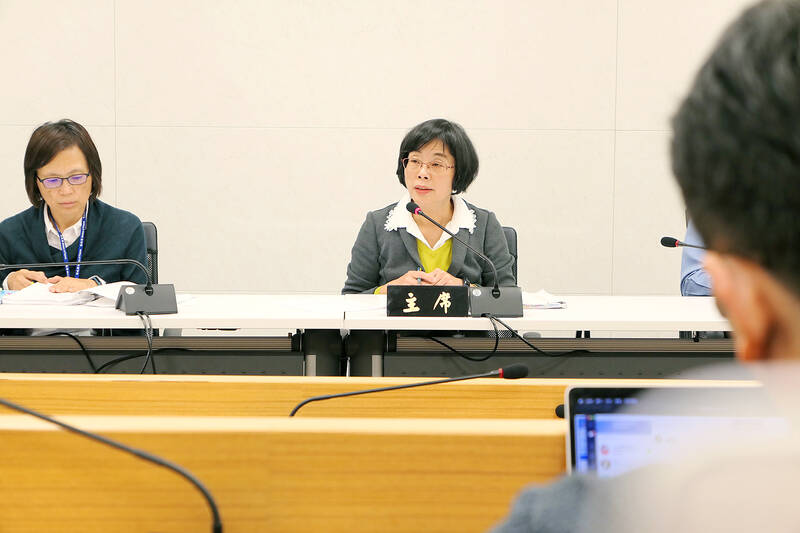Surplus tax revenue last year reached NT$495 billion (US$16.25 billion), beating the government’s target by 18.2 percent, mainly due to hefty gains from corporate and personal income taxes, the Ministry of Finance said yesterday.
There was a 12 percent increase to NT$3.22 trillion in tax revenue for the whole of last year, even though tax revenues for last month shrank 15 percent from a year earlier amid an ongoing economic slowdown, the ministry said.
Department of Statistics Deputy Director-General Chen Yu-feng (陳玉豐) said impressive GDP growth in 2021 helped boost corporate and personal incomes last year because of time lags in dividend distribution.

Photo: Wu Chia-jung, Taipei Times
Corporate income tax revenue last month declined 10.4 percent year-on-year, while personal income tax revenue fell 5.1 percent, as global inflation and monetary tightening hit local manufacturing firms, the backbone of the nation’s exports.
Tax revenue gained public attention recently as pundits called for stimulus measures using excess tax revenue to expand private consumption and offset this year’s poor exports.
Altogether, revenue generated from stamp, liquor, house, land, business and entertainment taxes all more than doubled last year from a year earlier, Chen said.
A quick recovery in domestic demand and a low comparison base in 2021 made the improvement more conspicuous, she said.
The nation earned record-high tax revenue last year, even as securities transaction tax revenue tumbled 36.3 percent to NT$175.6 billion, Chen said, adding that the sum still ranked the second highest in history.
The local stock market has in the past few years gained regional and global importance, thanks to the Taiwanese semiconductor firms’ leading posistions.
At the same time, land value gain tax revenue dropped 15.4 percent annually to NT$93 billion last year, in line with a 13.5 percent drop in taxable cases to 89,820, Chen said.
Sales tax revenue proved another drag because the government cut tax rates on several imported oil and raw materials to ease inflation pressure, she said.

MULTIFACETED: A task force has analyzed possible scenarios and created responses to assist domestic industries in dealing with US tariffs, the economics minister said The Executive Yuan is tomorrow to announce countermeasures to US President Donald Trump’s planned reciprocal tariffs, although the details of the plan would not be made public until Monday next week, Minister of Economic Affairs J.W. Kuo (郭智輝) said yesterday. The Cabinet established an economic and trade task force in November last year to deal with US trade and tariff related issues, Kuo told reporters outside the legislature in Taipei. The task force has been analyzing and evaluating all kinds of scenarios to identify suitable responses and determine how best to assist domestic industries in managing the effects of Trump’s tariffs, he

‘SWASTICAR’: Tesla CEO Elon Musk’s close association with Donald Trump has prompted opponents to brand him a ‘Nazi’ and resulted in a dramatic drop in sales Demonstrators descended on Tesla Inc dealerships across the US, and in Europe and Canada on Saturday to protest company chief Elon Musk, who has amassed extraordinary power as a top adviser to US President Donald Trump. Waving signs with messages such as “Musk is stealing our money” and “Reclaim our country,” the protests largely took place peacefully following fiery episodes of vandalism on Tesla vehicles, dealerships and other facilities in recent weeks that US officials have denounced as terrorism. Hundreds rallied on Saturday outside the Tesla dealership in Manhattan. Some blasted Musk, the world’s richest man, while others demanded the shuttering of his

TIGHT-LIPPED: UMC said it had no merger plans at the moment, after Nikkei Asia reported that the firm and GlobalFoundries were considering restarting merger talks United Microelectronics Corp (UMC, 聯電), the world’s No. 4 contract chipmaker, yesterday launched a new US$5 billion 12-inch chip factory in Singapore as part of its latest effort to diversify its manufacturing footprint amid growing geopolitical risks. The new factory, adjacent to UMC’s existing Singapore fab in the Pasir Res Wafer Fab Park, is scheduled to enter volume production next year, utilizing mature 22-nanometer and 28-nanometer process technologies, UMC said in a statement. The company plans to invest US$5 billion during the first phase of the new fab, which would have an installed capacity of 30,000 12-inch wafers per month, it said. The

Taiwan’s official purchasing managers’ index (PMI) last month rose 0.2 percentage points to 54.2, in a second consecutive month of expansion, thanks to front-loading demand intended to avoid potential US tariff hikes, the Chung-Hua Institution for Economic Research (CIER, 中華經濟研究院) said yesterday. While short-term demand appeared robust, uncertainties rose due to US President Donald Trump’s unpredictable trade policy, CIER president Lien Hsien-ming (連賢明) told a news conference in Taipei. Taiwan’s economy this year would be characterized by high-level fluctuations and the volatility would be wilder than most expect, Lien said Demand for electronics, particularly semiconductors, continues to benefit from US technology giants’ effort